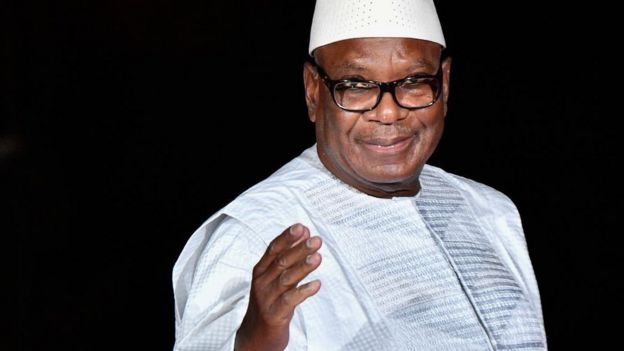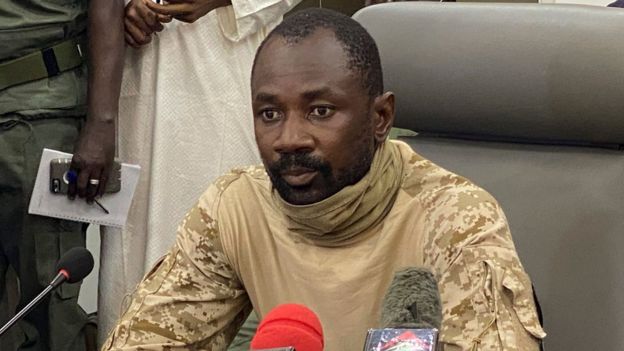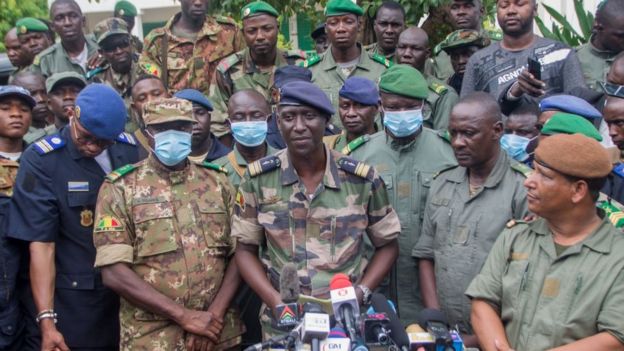
Under pressure, Mali coup leaders suggest ‘transitional president’
Baca Juga
Coup leaders in Mali say a transitional president will be appointed, drawn from either the civilian population or the military.
Ibrahim Boubacar Keïta was removed in a coup on Tuesday.
West African leaders have called for him to be reinstated and the UN has called for the release of officials.
But the coup leaders say they are in contact with the political opposition and other groups to try to set the transition in place.
They say elections will be held in what they describe as a reasonable time and have also promised to respect international agreements on fighting jihadists.
Earlier on Thursday, the Economic Community of West African States (Ecowas) said it would send envoys to ensure the return of constitutional order.
There is an increased military presence outside government ministries in the capital, Bamako, but shops and businesses have been open.
Mali, a vast country stretching into the Sahara Desert, is among the poorest in the world and has experienced several military takeovers. It is currently battling to contain a wave of jihadist attacks and ethnic violence.
Mr Keïta won a second term in elections in 2018, but since June has faced huge street protests over corruption, mismanagement of the economy and disputed legislative elections.
There has also been anger among troops about pay and the conflict with jihadists.
“We are going to set in place a transitional council, with a transitional president who is going to be either military or civilian,” junta spokesman Col Ismaël Wagué told TV channel France 24.
“We are in contact with civil society, opposition parties, the majority, everyone, to try to set the transition in place.”
The transition will happen “as quick as possible”, he added.

Under pressure, coup leaders have different ideas
Mary Harper, Africa editor, BBC World Service
The soldiers who seized power in Mali say they are in talks with the political opposition and other groups to try to set a transition in place.
Despite strong calls from regional and international powers for the reinstatement of the ousted president Ibrahim Boubacar Keita, the leaders of the coup and Mali’s domestic opposition have other ideas.
They want an authority that can fight corruption, revive the economy and bring an end to ethnic and jihadist violence.
It is a tall order, given that multiple international and regional interventions have been unable to resolve the country’s many crises.

Earlier, West African leaders called for Mr Keïta to be reinstated.
“Mali is in a critical situation, with serious risks that a collapse of the state and institutions leads to reversals in the fight against terrorism and organised crime, with every consequence for all our community,” the 15-member Ecowas said at the end of a video summit.
 Image copyrightGETTY IMAGES
Image copyrightGETTY IMAGES
The African Union earlier suspended Mali, saying military coups were “something of the past which we cannot accept anymore”.
French President Emmanuel Macron said that France and Germany condemned the coup and wanted the quickest possible transition to civilian rule.
France, Mali’s former colonial ruler, has several thousand troops based in Mali fighting Islamist militant groups and its Armed Forces Minister Florence Parly tweeted that this operation would continue.
Who are the coup leaders?
Colonel Assimi Goita has presented himself as leader of the new military junta, which is calling itself the National Committee for the Salvation of the People (CNSP) but little is known about him.
 Col Assimi Goita said he was now leading the military junta
Col Assimi Goita said he was now leading the military juntaCol Goita, said to be the head of Mali’s special forces, has vowed a rapid transfer of power.
Other members of the junta include Col Malick Diaw, CNSP vice-president, and Col Ismaël Wagué, the air force deputy chief of staff.
 Ismaël Wagué speaks during a press conference in Bamako
Ismaël Wagué speaks during a press conference in BamakoWhat does the opposition say?
One of the parties in the M5 opposition coalition, CMAS, said it would support the coup leader in “developing a roadmap” towards new elections and called for rallies on Friday “to celebrate the Malian people’s victory”.
After meeting the coup leaders, the head of Mali’s opposition M5 movement, conservative Imam Mahmoud Dicko, announced he would be withdrawing from politics. No reasons were given.
Mr Dicko was one of the key figures in the huge street protests calling for Mr Keïta to resign.
How did the coup take place?
It appears that mutinying soldiers took control of the Kati army camp, about 15km (nine miles) from Bamako, on Tuesday. They then marched on the capital, cheered by crowds who had gathered to demand Mr Keïta’s resignation.

The soldiers then stormed the presidential buildings, arresting Mr Keïta and his prime minister and taking them to Kati Camp. The president’s son, the speaker of the National Assembly, the foreign and finance ministers were also reported to have been detained.
Appearing on TV on Tuesday night, President Keïta said he would resign as he did not want “blood to be spilled to keep me in power”.
Source: BBC
The post Under pressure, Mali coup leaders suggest ‘transitional president’ appeared first on Nile Post.

0 Response to "Under pressure, Mali coup leaders suggest ‘transitional president’"
Post a Comment